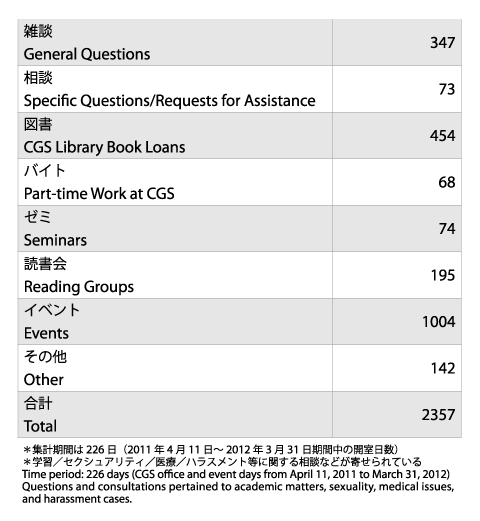Yuji KATO
Office Manager, CGS
【The article below is the same as the article that appears in the fifteenth issue of the CGS Newsletter.】
CGS office manager Yuji Kato discusses the upcoming R-Week Project in 2013 and the publication of the "The ICU Student Pocket Guide for LGBTs: Transgender/GID Issue." This student guide series was created by CGS in response to feedback received in 2011.
In 2011, 2,357 people visited CGS and/or attended CGS events, but this number does not include the many people who picked up brochures from the rack outside the office but did not enter. Please see the detailed summary in the table below.

I will focus here on the comments and questions pertaining to sexuality we received from students last year. For example, some transgender (TG) or Gender Identity Disorder (GID) students said that the university considered their individual needs regarding the usual gender-based divisions in annual health checks and room allocations at the ICU Student Retreat. Others said that they were in the process of having their student registration details changed. In recent years, the clinic and the Health and Physical Education Department has given special consideration to individuals, and the Human Rights Committee has enabled changes to the registration of students' names and gender since 2003. While these pioneering reforms should be commended, ICU has not made the information clear or easily accessible. Students who needed help or advice were only able to access information through hearsay or online posts and then dealt with the relevant departments by themselves.
In response to feedback, CGS began planning a series called "The ICU Student Pocket Guide for LGBTs"to gather information from ICU students, staff, and faculty, including CGS members. The first issue, "Transgender/GID," was based on interviews with two TG students and two professors who had some experience in providing support to those with TG/GID. The guide was edited by research institute assistant (RIA) Mao Ueda and published in April 2012. After a meeting with the relevant university departments, the guide was revised in May, and an English translation was published in September. It is currently structured as follows:
1. Changing your student registration details
2. Special consideration for annual student health checks
3. Special consideration in physical education classes
4. Multi-purpose toilets
We are planning to interview students, faculty, and staff in October for the next issue, which will be directed toward lesbian, gay, and bisexual students.
While there is still a need for more policies and action for LGBTs on campus, CGS is also receiving questions and requests for advice from asexual students who cannot be defined as LGBTs. There have also been students asking for information on DV counseling centers and advice on harassment cases. It is clear that there are diverse, wide-ranging issues pertaining to gender and sexuality on campus.
Furthermore, CGS activities usually prioritize gender and sexuality perspectives, but this does not mean that other perspectives should be neglected. For example, the current issue presents a comment by a TG student on the need for special consideration in male/female changing rooms. However, it can also be surmised that there are other students who may also want special consideration for physical, religious, or cultural reasons. Moreover, any student should be allowed to have privacy, if they want it, in a changing room. We cannot ensure human rights and diversity on campus without considering other related perspectives.
The R-Week Project that took shape concurrently with the LGBT student guide takes these issues into consideration. The R-Week project was inspired by C-Week, an ICU student week for thinking about the spirit of Christianity. The name is inclusive, as the "R" is derived from "rainbow" (the symbol of sexual diversity), "rights,""religion,""race," and "(child) rearing." We aim to make it a week of empowerment for solution-oriented action. Even though our central perspective will be on gender and sexuality, we will also consider what "R" means to each of the participants rather than fixating on just one definition or awareness.
Like C-Week, students will be central to R-Week by organizing and implementing lectures and workshops, entirely supported by CGS. Preparations began in 2010 with RIAs Mami Ebitani and Shingo Hori at the helm, and now we are calling for participation from students. Following last year's self awareness workshop series, CGS will run workshops on sex education and DV/ date rape in the autumn term directed toward new students. Such workshops will be run as part of R-Week from 2013.
Both the new LGBT student guide and the R-Week project were created with ICU students in mind. However, the guide has had an impact on students from other universities as well: for example, some students have tweeted that they asked their own university health centers whether they could be given special consideration in annual health checks as well. Clearly, there is a widespread need out there for accessible information and advice for LGBT students.
Although these may be just small initiatives by a small university, we intend to continue our efforts in the firm belief that circulating such information both within and outside the university can provide strength and hope and stimulate new action.